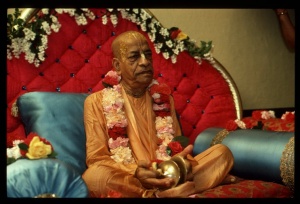SB 4.3.24: Difference between revisions
m (1 revision(s)) |
(Vanibot #0018 edit: make synonym terms in Sanskrit italic in SB - Vanisource) |
||
| Line 1: | Line 1: | ||
{{info | {{info | ||
|speaker=Lord | |speaker=Lord Śiva | ||
|listener=Satī, wife of Lord | |listener=Satī, wife of Lord Śiva | ||
}} | }} | ||
[[Category:Srimad-Bhagavatam - Canto 04 Chapter 03]] | |||
[[Category:Bhagavatam Verses Spoken by Lord Siva - Vanisource|040324]] | |||
<div style="float:left">'''[[Srimad-Bhagavatam]] - [[SB 4|Fourth Canto]] - [[SB 4.3: Talks Between Lord Siva and Sati|Chapter 3: Talks Between Lord Śiva and Satī]]'''</div> | |||
<div style="float:right">[[File:Go-previous.png|link=SB 4.3.23]] '''[[SB 4.3.23]] - [[SB 4.3.25]]''' [[File:Go-next.png|link=SB 4.3.25]]</div> | |||
{{RandomImage}} | |||
==== TEXT 24 ==== | ==== TEXT 24 ==== | ||
<div | <div class="verse"> | ||
tat te nirīkṣyo na pitāpi deha-kṛd | :tat te nirīkṣyo na pitāpi deha-kṛd | ||
dakṣo mama dviṭ tad-anuvratāś ca ye | :dakṣo mama dviṭ tad-anuvratāś ca ye | ||
yo viśvasṛg-yajña-gataṁ varoru mām | :yo viśvasṛg-yajña-gataṁ varoru mām | ||
anāgasaṁ durvacasākarot tiraḥ | :anāgasaṁ durvacasākarot tiraḥ | ||
</div> | </div> | ||
| Line 16: | Line 22: | ||
==== SYNONYMS ==== | ==== SYNONYMS ==== | ||
<div | <div class="synonyms"> | ||
''tat''—therefore; ''te''—your; ''nirīkṣyaḥ''—to be seen; ''na''—not; ''pitā''—your father; ''api''—although; ''deha-kṛt''—the giver of your body; ''dakṣaḥ''—Dakṣa; ''mama''—my; ''dviṭ''—envious; ''tat-anuvratāḥ''—his (Dakṣa's) followers; ''ca''—also; ''ye''—who; ''yaḥ''—who (Dakṣa); ''viśva-sṛk''—of the Viśvasṛks; ''yajña-gatam''—being present at the sacrifice; ''vara-ūru''—O Sati; ''mām''—me; ''anāgasam''—being innocent; ''durvacasā''—with cruel words; ''akarot tiraḥ''—has insulted. | |||
</div> | </div> | ||
| Line 23: | Line 29: | ||
==== TRANSLATION ==== | ==== TRANSLATION ==== | ||
<div | <div class="translation"> | ||
Therefore you should not see your father, although he is the giver of your body, because he and his followers are envious of me. Because of his envy, O most worshipful one, he has insulted me with cruel words although I am innocent. | Therefore you should not see your father, although he is the giver of your body, because he and his followers are envious of me. Because of his envy, O most worshipful one, he has insulted me with cruel words although I am innocent. | ||
</div> | </div> | ||
| Line 30: | Line 36: | ||
==== PURPORT ==== | ==== PURPORT ==== | ||
<div | <div class="purport"> | ||
For a woman, both the husband and the father are equally worshipable. The husband is the protector of a woman during her youthful life, whereas the father is her protector during her childhood. Thus both are worshipable, but especially the father because he is the giver of the body. Lord Śiva reminded Satī, "Your father is undoubtedly worshipable, even more than I am, but take care, for although he is the giver of your body, he may also be the taker of your body because when you see your father, because of your association with me, he may insult you. An insult from a relative is worse than death, especially when one is well situated." | For a woman, both the husband and the father are equally worshipable. The husband is the protector of a woman during her youthful life, whereas the father is her protector during her childhood. Thus both are worshipable, but especially the father because he is the giver of the body. Lord Śiva reminded Satī, "Your father is undoubtedly worshipable, even more than I am, but take care, for although he is the giver of your body, he may also be the taker of your body because when you see your father, because of your association with me, he may insult you. An insult from a relative is worse than death, especially when one is well situated." | ||
</div> | </div> | ||
__NOTOC__ | |||
<div style="float:right; clear:both;">[[File:Go-previous.png|link=SB 4.3.23]] '''[[SB 4.3.23]] - [[SB 4.3.25]]''' [[File:Go-next.png|link=SB 4.3.25]]</div> | |||
__NOTOC__ | |||
__NOEDITSECTION__ | |||
Revision as of 20:47, 30 November 2017

A.C. Bhaktivedanta Swami Prabhupada
TEXT 24
- tat te nirīkṣyo na pitāpi deha-kṛd
- dakṣo mama dviṭ tad-anuvratāś ca ye
- yo viśvasṛg-yajña-gataṁ varoru mām
- anāgasaṁ durvacasākarot tiraḥ
SYNONYMS
tat—therefore; te—your; nirīkṣyaḥ—to be seen; na—not; pitā—your father; api—although; deha-kṛt—the giver of your body; dakṣaḥ—Dakṣa; mama—my; dviṭ—envious; tat-anuvratāḥ—his (Dakṣa's) followers; ca—also; ye—who; yaḥ—who (Dakṣa); viśva-sṛk—of the Viśvasṛks; yajña-gatam—being present at the sacrifice; vara-ūru—O Sati; mām—me; anāgasam—being innocent; durvacasā—with cruel words; akarot tiraḥ—has insulted.
TRANSLATION
Therefore you should not see your father, although he is the giver of your body, because he and his followers are envious of me. Because of his envy, O most worshipful one, he has insulted me with cruel words although I am innocent.
PURPORT
For a woman, both the husband and the father are equally worshipable. The husband is the protector of a woman during her youthful life, whereas the father is her protector during her childhood. Thus both are worshipable, but especially the father because he is the giver of the body. Lord Śiva reminded Satī, "Your father is undoubtedly worshipable, even more than I am, but take care, for although he is the giver of your body, he may also be the taker of your body because when you see your father, because of your association with me, he may insult you. An insult from a relative is worse than death, especially when one is well situated."